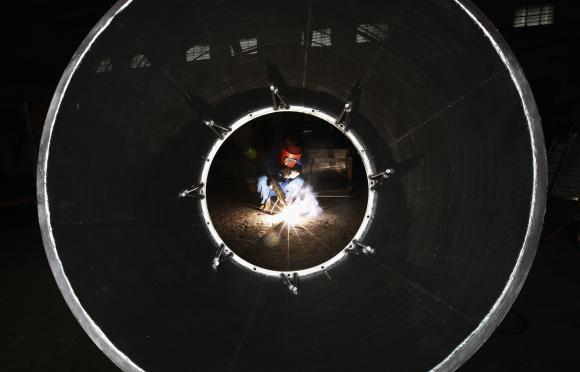 |
|
An employee works at a machine manufacturing factory in Huaibei, Anhui province, Sept 1, 2014. [Photo/Agencies] |
China's manufacturing sector unexpectedly picked up some momentum in September even as factory employment slumped to a five-and-a-half-year low, a survey showed on Tuesday.
Signs of a weakening labor market reinforced expectations that China would further relax financing conditions in coming weeks, but stop short of cutting interest rates or loosening the reserve requirement for all banks to support the economy.
The HSBC/Markit Flash China Purchasing Managers' Index (PMI) rose to 50.5 in September from August's final reading of 50.2.
Economists polled by Reuters had expected factory growth to stall at 50.0, the mark which separates expansion from contraction, citing deteriorating business confidence and the growing drag from the cooling property market.
 |
Instead, policymakers are likely to lower select lending rates such as mortgage rates, and the central bank may extend more loans to big banks with the cash being re-lent to businesses under a "re-lending" exercise, Lu said.
Economists' bets that there would be no overt policy easing are in line with remarks by senior leaders such as Finance Minister Lou Jiwei, who said over the weekend that China would not dramatically alter its policy based on any one indicator.
But the government's promises to desist from ramping up credit supply are increasingly being tested by a run of data showing that the world's second-biggest economy is sliding into a deeper slowdown.
Tuesday's PMI showed a measure of employment shed more than a point to drop to 46.9, its lowest since February 2009 during the global financial crisis, when a collapse in exports threw tens of millions of Chinese out of work.
A hefty drop in employment could raise alarm bells for the government, which has indicated it will tolerate slower economic growth below 7.5 percent for the year as long as employment is not affected.
"The real estate risk is already materializing," said Dariusz Kowalczyk, an economist at Credit Agricole Corporate and Investment Bank in Hong Kong.
"This will keep gross domestic product growth at a depressed level of around 7 percent year-on-year this quarter."
Still, Asian markets found consolation in the PMI poll that China's economy was not faring as badly as some feared. Stock markets and the Australian dollar clawed back some of their early losses, while Shanghai stocks rose.
